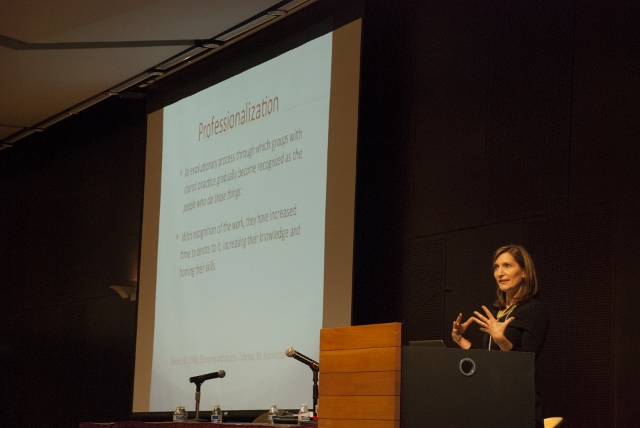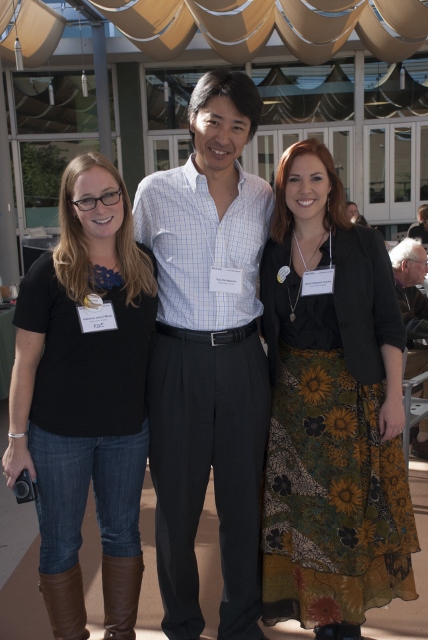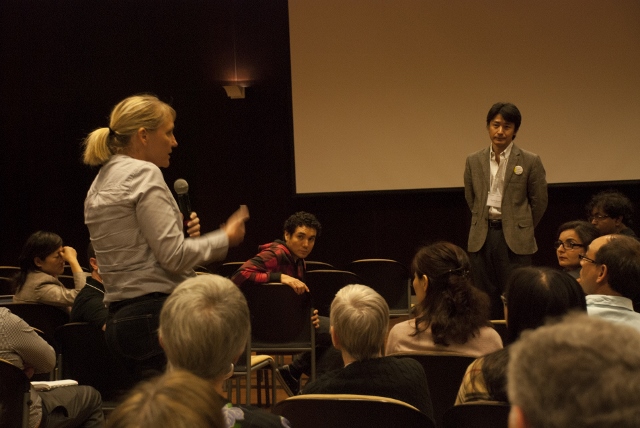|
Professionalization in Action: Plenary Talks
Six plenary speakers were invited to the 2014 Symposium.
Tony Silva (Purdue University) opened the
conference with his discussion of the current state of affairs in
higher education regarding international students. In his speech,
“Reflections of a Post-Mid-Career L2 Writing Professional on the
Ever-Increasing Challenges of Working at a Large Public Research
University in the United States: Facing the Specter of
Deprofessionalization,” Dr. Silva demonstrated that international
students, while being heavily recruited to fund a hurting U.S. higher
education system, might not be getting the language support that their
higher tuition fees could be paying for. Also on the first day,
Susan Miller-Cochran’s (North
Carolina State University) plenary speech complemented Dr. Silva’s as
she spoke about how to put prominent position statements from Conference on College Composition and Communication and Writing Program Administration in conversation with
each other and with scholarship on second language writers.
On the second day,
Lawrence
Zhang (University of Auckland) and
Dwight Atkinson (University of
Arizona) gave their plenary speeches. In “Pedagogical Imports of Western
Practices for Professionalizing Second Language Writing and Writing
Teacher Education,” Dr. Zhang spoke about the international aspects of
professionalization through case studies of two teachers who did not
speak BANA (British, American, New Zealander, or Australian) varieties
of English. Later that day, Dr. Atkinson stressed the importance of
adequately preparing doctoral students for research in “Doctoral Studies
as Professional Development in Second Language Writing.”
On the third and final day,
Deborah
Crusan (Wright State University) and
Christine Tardy (University of Arizona)
delivered their plenary speeches. Dr. Crusan spoke about her experience
with the impostor syndrome in the field of SLW. Her
speech, “Fake It 'Til You Make It: The Imposter Syndrome—the Dilemma of
(Women) Academics” encouraged anyone in the room suffering from feelings
of inadequacy to speak up and overcome them through strategies and
camaraderie. Dr. Tardy then finished the conference with her plenary
talk, “Representations of Professionalization in Second Language
Writing: A View from the Flagship Journal,” which outlined the
trajectory of the field’s professionalization as found through the Journal of Second Language Writing. She noted that
exchanges between authors and editorial board members have changed in
that authors situate their work differently, and editorial board members
evaluate work in the field of SLW differently as a result of the
increased maturation of the field.
Each plenary talk was thought-provoking and inspiring to L2 writing scholars at all stages in their careers.

Christine Tardy’s plenary speech. Photo by Seckin Gorucu.
New for 2014: Institute and Lunch Seminar
To facilitate the professionalization of the field, especially
for early- and midcareer L2 writing specialists, the symposium
introduced two new features: the Second Language Writing Institute and
the Lunch Seminar.
The Institute,
held before the conference on Thursday morning, featured 2-hour
workshops by invited presenters Cristyn Elder, Dana Ferris, Paul Kei
Matsuda, Susan Miller-Cochran, Shirley K. Rose, and Christopher Tancock.
Topics ranged from early career concerns, such as demystifying the
process of going on the job market; to midcareer issues of creating a
sustainable research program, perfecting presentations, and publishing;
to maturing career events, including consulting and writing program
administration. The Institutes provided attendees with an additional
opportunity for ongoing education. Presenter Dana Ferris said, “The
session was lively and interactive, and the participants were very
engaged.”
|

Paul Kei Matsuda (center), Founding Chair of SSLW, with Katherine
Daily O'Meara (left) and Sarah Elizabeth Snyder (right), SSLW 2014
Assistant Co-Chairs, at the Lunch Seminar. Photo by Seckin Gorucu.
|
The
Lunch Seminar on the third
day provided a casual space for drop-in mentoring and networking for
SLW scholars anywhere in their career path. Designed with a
“speed-dating” format, the participants were encouraged to visit all of
the volunteer mentors seated at different tables during lunch. The
mentors who volunteered their time for this event were Dwight Atkinson,
John Bitchener, Deborah Crusan, Dana Ferris, Mark A. James, Paul Kei
Matsuda, Christine Pearson Casanave, Tony Silva, Neomy Storch, Christine
Tardy, and Lawrence Zhang.
Both of these new events were highlights of the conference for
many attendees. We hope both the Institute and the Lunch Seminar will be
offered and featured in future symposia.
Notable Collaborations and Presentations
In the professional spirit of reaching out to other
organizations, this year’s SSLW also featured invited sessions by
representatives from various organizations, including the Second
Language Writing Interest Section (TESOL); the Standing Group on Second
Language Writing (CCCC); The National Association of English Writing,
Teaching, and Research, China; and the European Association for the
Teaching of Academic Writing (EATAW). These sessions were invaluable to
the symposium for their unique perspectives and orientations.
Another notable session was the open discussion session, “L2
Writing Apocalypse and the Future of the Profession” led by Paul Kei
Matsuda. In a vigorous discussion, it was concluded that indeed the
future of the profession is bright. Professionals from all walks of life
and corners of the world, as well as levels of professionalization,
contributed to this lively event.

Dr. Cristyn Elder (left) engages Dr. Paul Kei Matsuda (right) in the open discussion during “L2 Writing Apocalypse.” Photo by Seckin Gorucu.
SSLW, as a more intimate conference, also exhibited 10
invited colloquia, 4 featured presentations, 180 papers, and 10
workshops. The Symposium’s personal feel encouraged many to attend and
participate. For example, Cristyn Elder (University of New Mexico) said
about her involvement in the institute that, “When I was a graduate
student, I had great mentoring for the job market and the next stage in
my own career, so it was a great honor for me to help pay it forward, so
to speak.” Newer members in the L2 writing community also reported
their feelings of amazement “being surrounded by so many like-minded
professionals.” First-time attendee Daniel Wilber (Boise State
University) continued:
The presentations, keynote speakers, and hallway conversations
collectively revealed how important it is to build a close-knit
community and just how far we have to go towards understanding our work
and the individuals we work to help. I am so glad I came!
Looking Ahead: SSLW 2015
This calendar year will host the 14th Symposium on Second
Language Writing in Auckland, New Zealand. Organized by John Bitchener
(Auckland University of Technology) and his conference committee, SSLW
2015 will speak to the theme “Learning to Write for Academic Purposes:
Advancing Theory, Research and Practice.” We look forward to keynote
addresses from Ken Hyland, Rosa Manchón, and Paul Kei Matsuda, as well
as 30-minute sessions with a number of invited speakers who will share
“hands-on, practice-focused” experiences on various issues that L2
teachers and students encounter in day-to-day practice. The SSLW 2015 website is up and
running—check out key dates and more info as it is added.
Thank you to all who participated in 2014 in continuing to make
the Symposium on Second Language Writing a success.
Katherine Daily O’Meara (SSLW 2014 Assistant
Co-Chair) is a 4th-year PhD candidate at Arizona State University. She
is the current associate director of second language writing in the ASU
Writing Programs. She has designed/instituted a graduate-level academic L2 writing course and an L2 writing tutor internship for M-TESOL students. Kat’s dissertation is an institutional
ethnography of L2 writing teachers that explores intersections among the
transdisciplinary fields of rhetoric and composition, writing program
administration, and second language writing.
Sarah Elizabeth Snyder (Clavell) (SSLW 2014 Assistant
Co-Chair) is a 2nd-year PhD student at Arizona State University, where
she serves as the assistant director of second language writing in the
ASU Writing Programs. She teaches composition and language support
courses for international students and supports the L2 Writing Teacher
practicum. Sarah’s interests are in administration of second language
writing programs and retention of underserved student populations. | 
